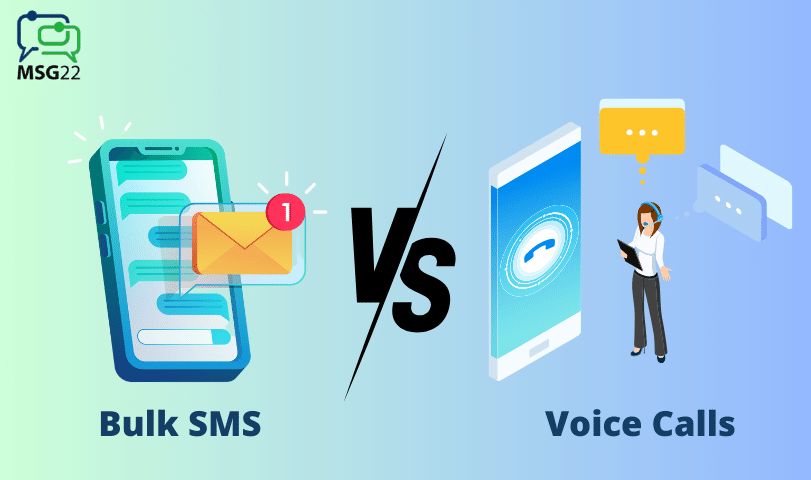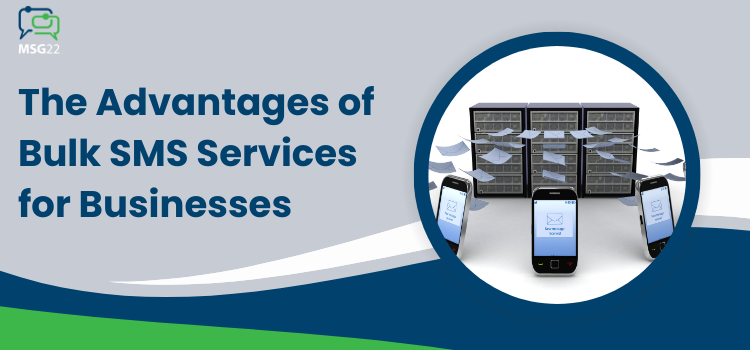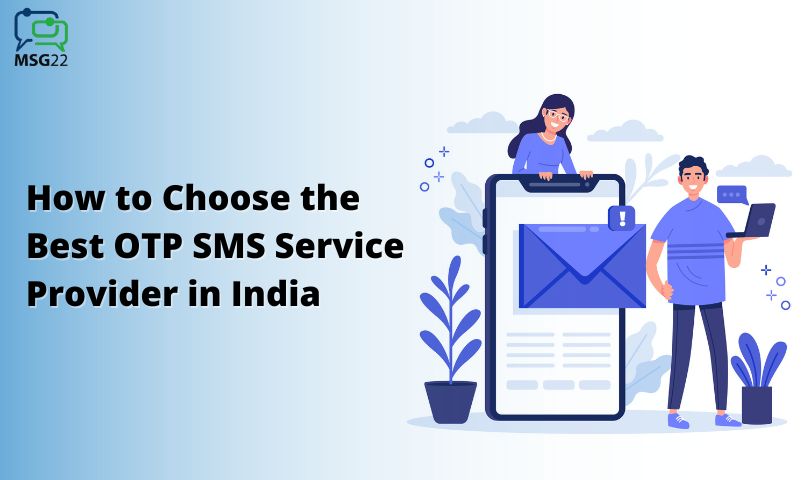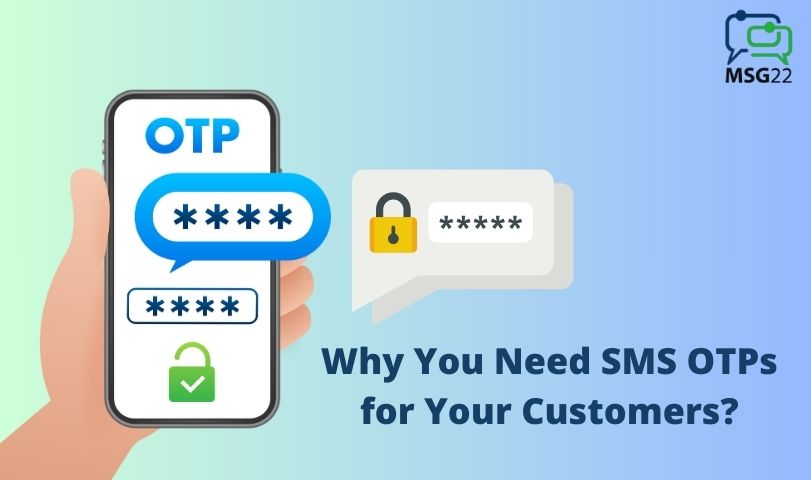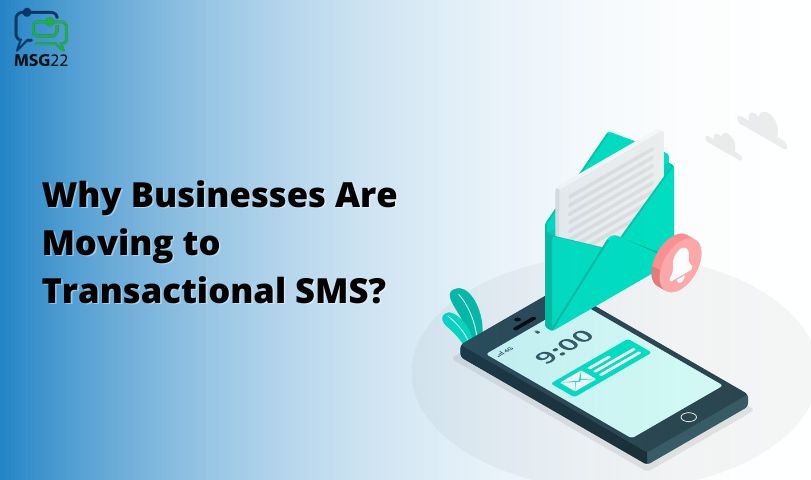Businesses are always looking for efficient routes of communication. Voice calls and Bulk SMS service are two popular choices. An in-depth analysis of each will be provided in this blog, along with comparisons of their costs, reach, suitability of content, delivery times, consumer preferences, and personalization.
By the conclusion, you’ll be better prepared to choose the channel of communication that best supports your company’s objectives.
Understanding Bulk SMS and Voice Call Marketing
Bulk SMS Marketing
Bulk SMS marketing (also known as mass SMS marketing) is the technique of sending text messages to a list of consented contacts in large numbers. In layman’s words, it means sending a large number of texts to a huge number of people at the same time.
It’s a channel your customers choose to receive, as opposed to pay-per-click (PPC) advertising, sponsored communications, or ads. Also, it is illegal under the Telephone Consumer Protection Act (TCPA) to text or contact a cell phone number without prior agreement.

Voice Call Marketing
Voice Call Marketing is an effective strategy for reaching out to a certain audience. In a short amount of time, it links millions of clients. Voice calls and pre-recorded voice messages sent to mobile phones and landline phones produce excellent results.
They are automated calls in which numerous numbers are dialed at the same time utilizing computer-managed lists. This communication technology has a wide range of applications.

Key Benefits of Bulk SMS and Voice Call Marketing
Bulk SMS Key Features
- Mass Messaging
Bulk SMS service allows organizations to get in touch with messages to thousands, if not millions, of people at the same time. The aforementioned tool is extremely helpful in marketing, event reminders, as well as emergency alerts. You are allowed to broadcast your message to an extensive demographic with a single click, saving the effort and time required.
- Personalization
Personalization can be accomplished with bulk SMS by addressing receivers by name or inserting customized content. This personalized touch improves the appealing nature of your messages as well as raises its chances of client engagement as well as response.
- Scheduled Sending
Businesses may plan their SMS campaigns in advance with scheduled sending, ensuring messages are sent at the most appropriate moments. This capability is very handy when trying to get out to clients in different time zones or for synchronizing with particular occasions or promotions.
- Contact Management
Bulk SMS service solutions include powerful contact management tools. Businesses may manage their customer contact lists, and segment recipients in accordance with demographics or activity, as well as maintain an up-to-date database for more effective targeting as well as personalization.
Voice Call Key Features
- Bulk Voice SMS for Mass Communication
Voice marketing allows companies to simultaneously broadcast pre-recorded audio messages to an extremely large audience. When you need to educate a large consumer base with critical information, promotions, or updates, this mass communication capability can be extremely helpful.
Bulk voice SMS makes certain that your message gets delivered to a big audience swiftly, whether you’re announcing an upcoming launch, sharing a unique offer, or sending out an emergency notice.
- Efficient Voice Messaging
An effective form of communication is provided by voice call marketing. Voice messages, in contrast to text messages, don’t require the recipients to read them; instead, they are presented in a way that is clear to listeners right away. When giving complex instructions, giving updates, or announcing significant news, this can be particularly helpful.
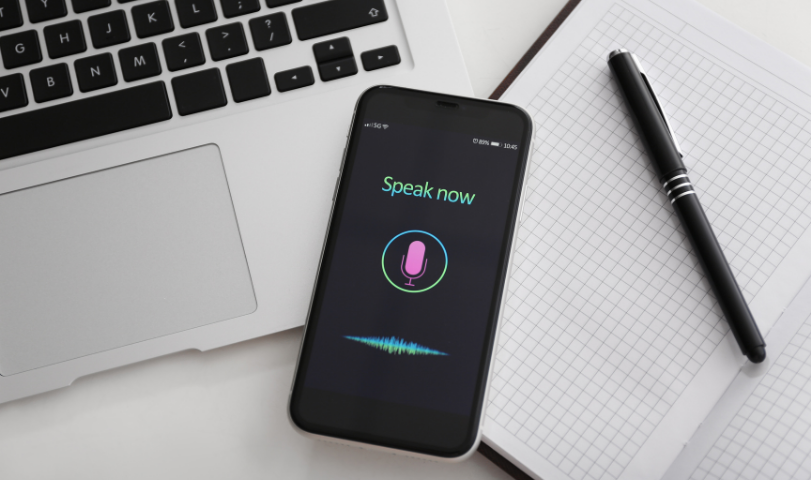
The effectiveness of voice messaging also includes the capability for companies to pre-record their message in order to guarantee its uniformity as well as accuracy. By doing this, the prospect of miscommunication or misunderstanding is reduced. These things might occasionally happen during live discussions or text-based messages.
- Save Time with Message Segments
Businesses can focus on particular recipients with customized messages thanks to the ability to generate message segments that is provided by many Voice Call services. This function saves time and guarantees that messages are appropriate for the target audience.
In order to guarantee that each group receives information relevant to its function, a political campaign, for example, could use message segments to send distinct messages to volunteers as well as registered voters. In a similar vein, a retail company can send various promos to many different consumer categories depending on their purchasing habits or preferences.
- Regional Language Support
Businesses that want to communicate with a wider audience in today’s diverse and multicultural society must provide communication in regional languages. Businesses may communicate with their clients in whatever language they prefer thanks to the multiple dialects and languages that are frequently supported by voice call marketing solutions.
Think about a corporation that offers online shopping to people from various languages as well as geographic origins.
Comparing Bulk SMS and Voice Calls
1. Cost Comparison
- Bulk SMS: Compared to voice calls, bulk SMS is typically more affordable. With a cheaper cost per message sent, SMS is a desirable solution for companies on a tight budget. SMS platforms frequently provide price structures based on the quantity of messages sent, as well as bulk discounts are frequently offered to customers who send a great deal of texts.
- Voice Calls: Due to the infrastructure needed for voice transmission, voice calls are typically more expensive than SMS. Along with the cost of message transmission, there are other costs related to voice recording and broadcasting technologies.
2. Reach and Engagement Comparison
- Bulk SMS: SMS messages frequently have an open rate of over 90%, making them an excellent means for contacting a wide demographic. SMS messages are more likely to be read right away since most individuals always keep their mobile phones close at hand. Engagement, however, could vary based on the message’s substance as well as the receiver’s interest.
- Voice Calls: Because of the spoken words and voice tone used to communicate information, voice calls offer an enjoyable listening experience. They’re equipped with the power to stir feelings and maintain the listener’s interest. Call pick-up rates can be lower than SMS, and not everyone is going to respond to or answer voicemails.
3. Message Content Suitability
- Bulk SMS: SMS messages are perfect for brief, succinct communications that recipients may easily digest when delivered in bulk. They work well for alarms, one-time passwords, reminders for appointments, as well as promotional offers. They might not be helpful when communicating complex facts or strong emotional signals, though.
- Voice calls: Voice calls are great for conveying particular information, directives, or emotive messages. They perform well in sending out personalized greetings, surveys, details about products, and significant announcements. Text cannot properly express the variation as well as the emotion that spoken voice can.
4. Message Delivery Speed
- Bulk SMS: Because SMS messages are nearly quickly delivered, recipients are given timely information. This speed is ideal for time-sensitive offers, important alerts, urgent updates, or other situations requiring quick action.
- Voice Calls: Because of the call start as well as receiver interaction (answering or leaving a voicemail), voice messages may take a little longer to deliver. Voice communications nevertheless offer comparatively quick delivery despite the fact that they are not as immediate as SMS.
5. Customer Preferences
- Bulk SMS: For transactional messages like order confirmations, delivery status updates, and appointment reminders, many customers choose SMS. SMS is frequently utilized for marketing promotions. Customers value text messages’ simplicity and lack of intrusion.
- Voice Calls: When a personal touch is required or when communicating sensitive or emotionally charged information, voice calls are preferred. For difficult instructions or communications needing empathy, some clients can find audio messaging more engrossing and reliable.
6. Personalization Option
- Bulk SMS: Using names or including pertinent information in bulk SMS messages enables some personalization. Personalization is feasible, but voice communication may be more immersive.
- Voice Calls: High levels of personalization are available with voice calls. You can record customized audio messages that address listeners by name and exude a feeling of close attention. This personalized touch may improve response and engagement rates.
Which one is Better Suited for Your Business?
The precise objectives as well as the target market of your organization will determine whether you ought to employ voice calls or bulk SMS. Bulk SMS might be the best option if you require quick, affordable communication for brief communications.
Voice Calls, on the other hand, might prove more appropriate if you demand a more active role in individualized communication, and the capacity to communicate complex information. A communication plan for your company that uses both mediums has the potential to be effective.
Conclusion
When it comes to choosing between voice SMS and bulk SMS, your specific business requirements as well as your target market will ultimately determine which method of communication to use Bulk SMS service or Voice Calls. Voice Calls thrive at customization as well as engagement while Bulk SMS delivers affordable, flexible communications.
Choosing the proper decision is essential for excellent communication and commercial consequences. Take into account your budget, message content, and preferences of the audience.
